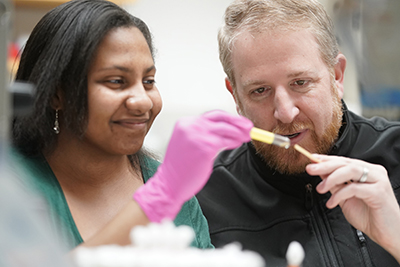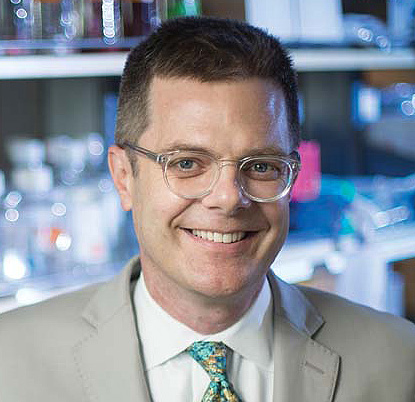Research, News & Discoveries
-

Discovery shows how synapses are built and function in the nervous system
Nerve cells in the brain establish connections or synapses to form complex electrical circuits that keep people thinking and moving. Despite the importance of these synapses in mediating the flow of charged particles between neurons, not much is understood about how these connections are created. Sierra Palumbos David Miller Research… Read MoreNov. 8, 2021
-

Harrison Society researcher discovers key regulator of kidney cell structure
A molecular switch that regulates the cytoskeleton — the cellular equivalent of our skeleton — is required for the maintenance and integrity of the kidney collecting duct, Vanderbilt researchers have found. The discovery, reported in the Nov. 1 issue of the Journal of Cell Biology, could… Read MoreNov. 4, 2021
-

A new regulator of fat metabolism
By Wendy Bindeman Sheila Collins, professor of medicine. Sheila Collins, who is a professor of medicine and has a secondary appointment in molecular physiology and biophysics, first author Fubiao Shi, a postdoctoral fellow in the Collins lab, and colleagues have recently identified the transcription factor PPARγ as a novel regulator… Read MoreNov. 3, 2021
-

Darwin’s magnificent mystery and the microbiome
Vanderbilt researchers are reimagining Charles Darwin’s work by communicating how the origin of species might depend largely on the microbiome—the totality of bacteria, viruses, fungi and other organisms—living in or on a host body. Darwin’s On the Origin of Species put forth a seminal and revolutionary thesis for the life sciences in 1859: Populations with a common… Read MoreNov. 2, 2021
-

Scott Hiebert, PhD awarded grant from V Foundation to support study of pediatric soft tissue sarcoma
The V Foundation for Cancer Research has awarded a $600,000 grant to Scott Hiebert, PhD, professor of Biochemistry and Medicine, to pursue a possible precision therapy for a type of sarcoma that predominantly affects children. Scott Hiebert, PhD Hiebert, the Hortense B. Ingram Professor of Cancer Research, will develop a… Read MoreOct. 29, 2021
-

Eat breakfast and stop late-night snacking
Researchers have confirmed that due to daily circadian rhythms regulating metabolism, when you eat is as important as the how much and what you eat when trying to gain, lose or maintain weight. Carl Johnson, professor of biological sciences, collaborated with graduate student Kevin P. Kelly to test how the timing of daily meals and snacks throughout the day affects weight maintenance. With 24-hour access to… Read MoreOct. 29, 2021
-

Vanderbilt Vaccine Center a step closer to broad ebolavirus protection
A combination of two broadly acting monoclonal antibodies isolated by researchers at Vanderbilt University Medical Center protected non-human primates from ebolavirus disease, which causes severe and often-fatal hemorrhagic fever in humans. Their findings, published this week in the journal Cell, bring closer to development the first clinical therapy effective… Read MoreOct. 29, 2021
-

Pancreatic beta-cell booster
Type 2 diabetes is characterized by chronic hyperglycemia (high blood glucose) and inflammation, which are associated with increased levels of circulating prostaglandin E2 (PGE2) — a mediator of inflammation. Maureen Gannon, PhD, and colleagues previously showed that blocking one of the PGE2 receptors, EP3, promoted insulin-secreting… Read MoreOct. 29, 2021
-

Zost honored for research on COVID-19, other life-threatening viral diseases
Seth Zost, PhD, a research fellow in the laboratory of James E. Crowe Jr., MD, director of the Vanderbilt Vaccine Center, has been awarded a major international prize for his research on COVID-19 and other life-threatening viral diseases. The Claude Hannoun Prize for Best Body of Work is… Read MoreOct. 29, 2021
-

Protein Society President’s Column Honors Oswald Avery
An editorial, written by president of The Protein Society Chuck Sanders, appears in the October 2021 issue of the Society’s newsletter. It came to my attention that Oswald Avery is buried here in Nashville at the atmospheric Mt. Olivet Cemetery—I had been told that my Dean,… Read MoreOct. 27, 2021